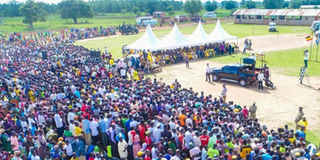Where do we draw the line between early campaigns and poverty alleviation drive?

President Museveni addresses a public rally in Abongo Rwot village, Agali Sub County in Lira District recently. PPU PHOTO
What you need to know:
The costs. Since President Museveni seems to be seeking endorsement for his sole candidature from different parts of the country, it would have been expected that at the very least the NRM should pay for his travels. Instead the burden has been pushed to a poverty-ridden public.
Parliament recently approved a staggering Shs33 billion for State House to run President Museveni’s activities across the country of the next few weeks.
The supplementary request tabled before the Parliamentary Budget Committee by Minister of State for Planning, Mr David Bahati, indicated that the money will be used for transporting, feeding and accommodating the President and his entourage.
A significant part of the budget, approximately Shs17.6 billion, has been allocated to the NRM party chairman’s public sensitisation of poverty alleviation in different parts of the country.
It seems ironic and strange that after more than 30 years in power, the NRM needs to spend huge amounts of taxpayers’ money on sensitising the public on poverty alleviation. The minimum expectations are that NRM wealth creation strategies should now be bearing fruits of prosperity for many Ugandans.
It should, therefore, have been the case that the President’s travel budget would have funded prosperous individuals and groups who have been pulled out of poverty to demonstrate to the nation how successful NRM has been.
It seems government is slightly embarrassed by the latest request for the money, and in trying to explain why the President needs this money, Finance minister Matia Kasaija said: “He (President Museveni) has to fly; there are cars following him, then the advance team, so it is not cheap.”
If government was aware that the costs are high and the public still have to get basics in service delivery, why then would the NRM insist on subjecting the population to actions that do not benefit ordinary Ugandans?

Victoria Nyeko
There are several glaring contractions between what the ruling party says and their actions. Subsequently, this increases the disconnect between the NRM and the public. In this instance, it seems that the poverty alleviation tours are designed to benefit the proposed NRM sole candidate in an early campaign for 2021.
Since President Museveni seems to be seeking endorsement for his sole candidature from different parts of the country, it would have been expected that at the very least the NRM should pay for his travels. Instead the burden has been pushed to a poverty-ridden public.
According to President Museveni in his book Sowing the Mustard Seed, on April 11, 1979, when Idi Amin fled Kampala, all weapons had to be surrendered to the Uganda National Liberation Army (UNLA), but some members led by Otafiire felt that not all weapons should be handed in as directed, but instead be hidden.
According to President Museveni, due to his ethics and values, his views were different for two reasons: “First as leaders we must always be true to our word, it is a disaster to have leaders who say one thing and do something else because that creates fundamental crisis in society.
“Secondly, to avoid being seen as dishonest and hypocrites, what if we lie and not hand in all the guns and then the hidden guns are discovered, I would feel rotten to swear that l had handed in all the rifles when, in fact, I was keeping some hidden somewhere.”
Seven years later, in 1986, Mr Museveni’s group assumed power and with their high ethical values intact. There were equally high expectations from Ugandans.
Although there has been relative peace over the years, poverty continues to be untamed and elusive under the NRM government.
Ms Victoria Nyeko is a media commentator.
[email protected]
Twitter:@VictoriaNyeko




